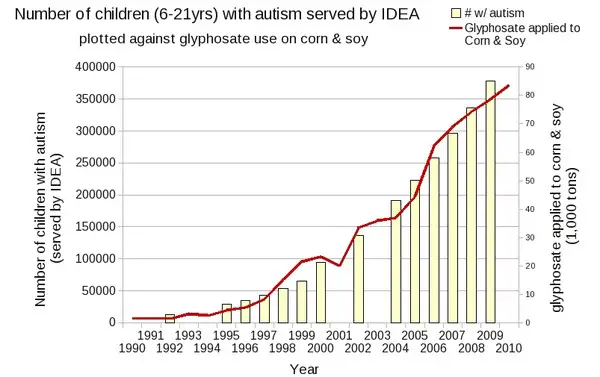MIT Researcher’s New Warning: At Today’s Rate, Half Of All U.S. Children Will Be Autistic By 2025
Research scientist Stephanie Seneff of the Massachusetts Institute of Technology (MIT), a widely published author on topics ranging from Azlheimer’s Disease to autism and cardiovascular disease, raised plenty of eyebrows recently with a bold proclamation on autism at a special panel in Massachusetts about genetically modified organisms and other topics.
“At today’s rate, by 2025, one in two children will be autistic,” Seneff said last Thursday in Groton, MA at an event sponsored by the holistic-focused Groton Wellness organization.
http://earthweareone.com/mit-
Seneff presented slides showing a remarkably consistent correlation between the rising use of Roundup (with its active ingredient glyphosate) on crops and the rising rates of autism; while it doesn’t show a direct correlation it does give researchers plenty to think about, especially considering Seneff’s research into the side effects of autism that mimic glyphosate toxicity and deficiencies.
The slide notes that the heaviest use of Roundup, Monsanto’s flagship weedkiller, began in 1990 and continued to rise since. Meanwhile, the number of kids with autism has gone from 1 in 5,000 in 1975 to 1 in 68 today, a puzzling and frustrating stat that shows no signs of slowing down and one that correlates strongly with the rise in glyphosate use.
Of course, autism is a complex problem with many potential causes, but the numbers are particularly of note considering how close the correlation is, and Seneff’s credentials.
Dr. Seneff has written 10 papers (7 as the first author) in various medical and health journals on modern diseases as well as drug side effects, nutritional deficiencies and the impacts of environmental toxins on our health. She also worked as a Senior Research Scientist at the MIT Computer Science and Artificial Intelligence Laboratory before turning to biology, as her official biography notes.
You can read more about her presentation on the website The Complete Patient by clicking here, and you can also check out the full versions of her slides on glyphosate and autism by clicking here.
EPA DEBATING ROUNDUP BAN OR RESTRICTIONS, ARE THEY BEING OBJECTIVE?
Recently, the group Moms Across America visited with officials from the EPA to discuss a potential ban or restrictions on Roundup, especially in light of recent findings that the active ingredient glyphosate is found in the breast milk of American mothers at levels that are a dangerous 760 to 1600 times higher than allowable limits in European drinking water.
While the group made its point loud and clear, it is well worth noting than many of the 100 studies provided for the EPA’s review were actually provided by the chemical companies themselves.
Urine testing has also shown that Americans have 10 times the glyphosate accumulation in their urine than Europeans, and children with autism have many biomarkers indicating excessive glyphosate in their systems including key mineral deficiencies, seizures and mitochondrial (the cell’s power center) disorders.
SENEFF RESPONDS TO MONSANTO’S KEY ARGUMENT
While Monsanto claims that Roundup is harmless because humans don’t have a shikimate pathway, which it inhibits, Seneff notes that our gut bacteria do have this pathway, and that’s crucial because these bacteria supply our body with crucial amino acids.
She also says that most studies are too short to show Roundup’s oft-studied effects as a cumulative toxin, one that builds up both in the environment and in our bodies over time.
According to Seneff, Roundup has the following side effects: it kills beneficial gut bacteria, allowing pathogens to grow; interferes with the synthesis of amino acids and methionine which leads to shortages in critical neurotransmitters and folate; chelates (removes) important minerals like iron, cobalt and manganese, and much more.
Additional chemicals in Roundup are untested because they’re classified as “inert,”she notes in her presentation, butaccording to a 2014 study in BioMed Research International they are capable of amplifying the ill effects of Roundup hundreds of times over.
To learn more about Seneff’s warning over autism and Roundup accumulation, you can view her slideshow on the topic. Until then, it’s best to exercise caution, and to buy and grow organic food whenever possible.
Dr. Stephanie Seneff, senior researcher at MIT, speaking at this year’s Autism One conference:


Most research money linked to ASD goes towards looking for a genetic link or gene CNV. Most scientists admit that there is evidence that the CNV is caused by an environmental insult in chemical form, i.e., herbicides, pesticides, dry cleaning solvents, fire retardant chemicals, etc. Whatever it is, it is that is causing this uptick is clearly all around us--pervasive in our atmosphere and environment.
ReplyDeletecheap oakley sunglasses
ReplyDeletekate spade
tory burch flats
kate spade handbags
cheap nfl jerseys
coach factory outlet
michael kors outlet
nike nfl jerseys
coach factory outlet
lebron james shoes
michael kors outlet online
ray ban outlet
louis vuitton handbags
louis vuitton outlet
adidas shoes
louis vuitton outlet
christian louboutin shoes
oakley sunglasses
nike uk
louis vuitton handbags
jordan 4 toro
burberry outlet
oakley sunglasses
coach outlet
juicy couture
tiffany outlet
lebron james shoes 13
ghd flat iron
louis vuitton bags
cheap oakley sunglasses
caoch outlet
nike air max
oakley vault
true religion
michael kors outlet
michael kors handbags
nike outlet store
michael kors handbags
polo ralph shirts
michael kors handbags
20166.24wengdongdong